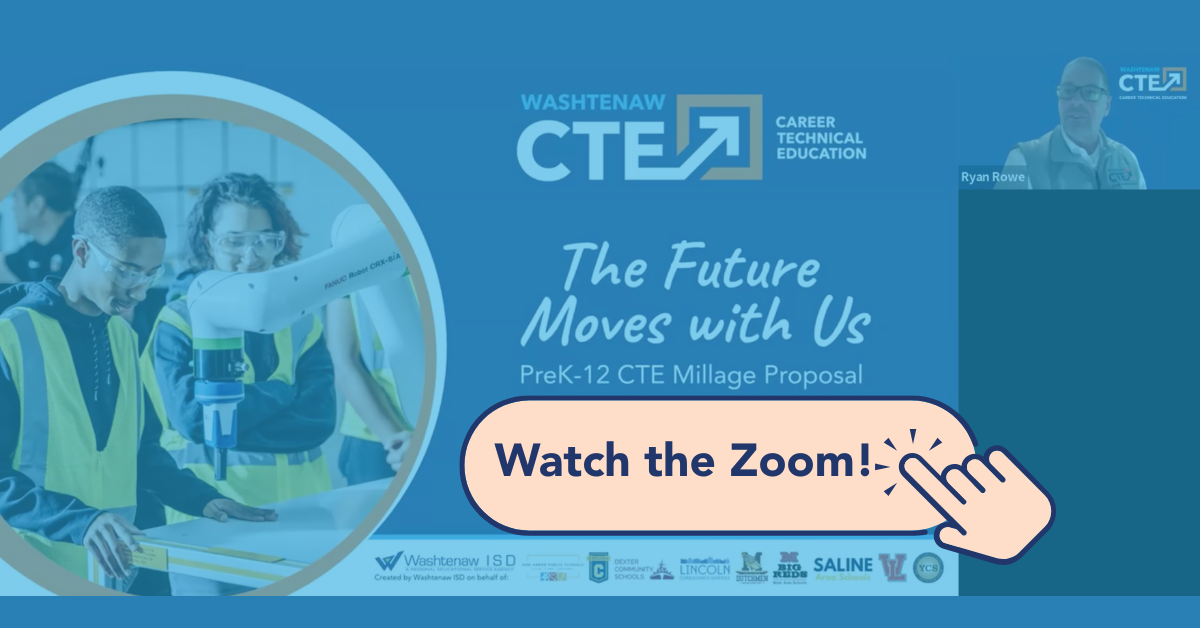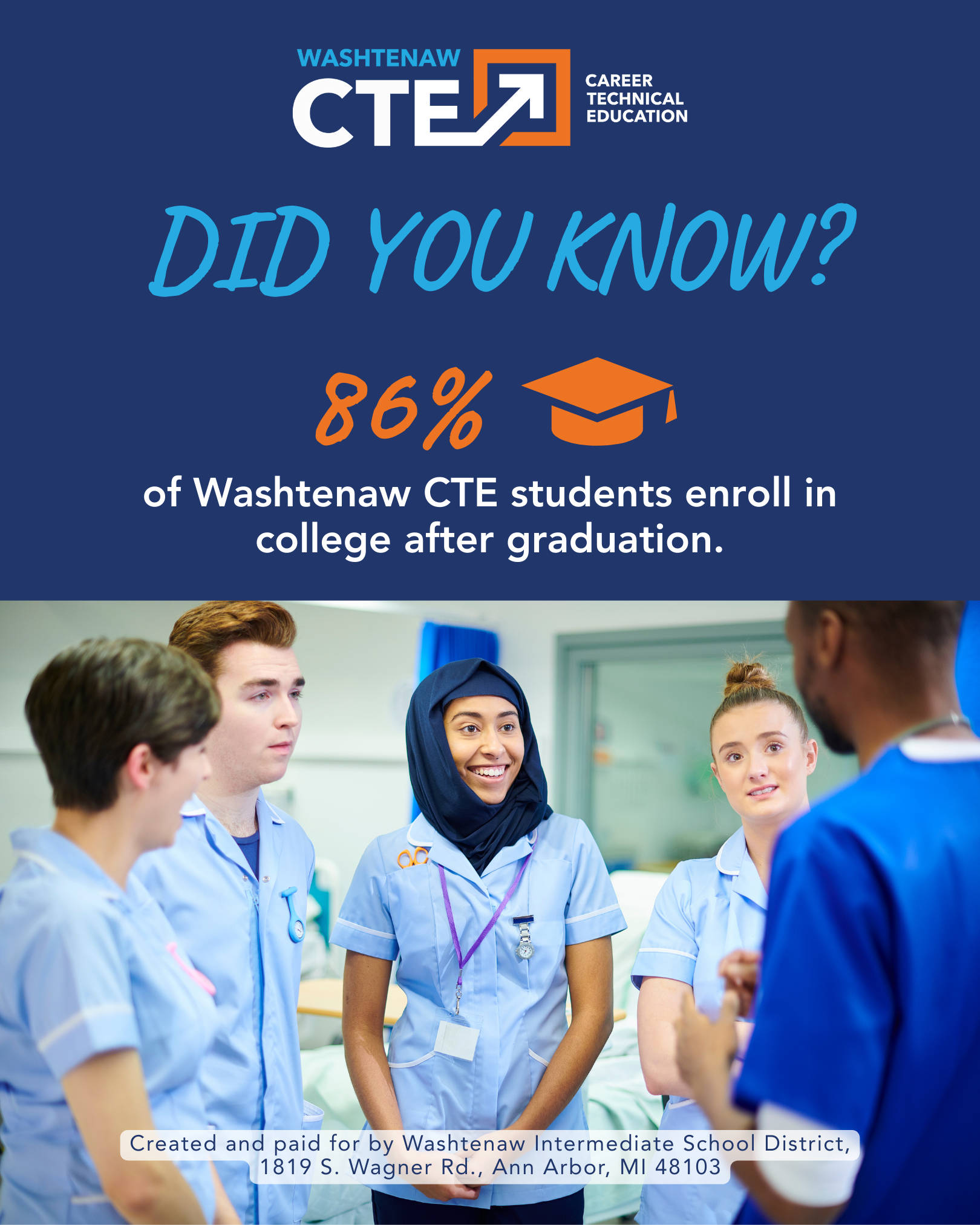
Career Technical Education Millage Proposal
Election update
WISD Thanks Voters for Supporting Career Technical Education Millage
Constituents of the Washtenaw Intermediate School District (WISD) approved the countywide Career Technical Education (CTE) millage in the November 4, 2025, election. Read the election results press release here.
On the November 4, 2025, ballot, voters residing in school districts served by the WISD will vote on this 1.0 mill, 10-year proposal to expand countywide access to PreK-12 CTE programs. This proposal would support operational costs to provide Career Technical Education (CTE) learning experiences from preschool through high school graduation. If approved, the CTE millage would be used by Washtenaw ISD to reimburse all local public school districts for existing CTE expenses and also develop new countywide CTE learning opportunities.
What is CTE?
Career Technical Education, or CTE, is an educational approach where students learn by doing, combining traditional, rigorous academic concepts with practical and technical skills. Through CTE, students explore their interests and skills and then eventually match them to high-wage, high-skill, in-demand career pathways, such as:
- Healthcare
- Automotive Technology
- Engineering
- Robotics
- Entrepreneurship
- Construction Trades
- Cybersecurity
- Computer Programming
- Aviation and Aerospace
- Business, Finance, and Marketing
- Agriscience, and more!
In Washtenaw County, CTE programs are a PreK-12 launchpad for discovery, where learning is active, industry-connected, and designed to inspire the next generation of professionals. CTE gives students the chance to explore their purpose, passions, and potential through hands-on experiences, real world opportunities, and pathways that lead to college and career success.
On-Demand Zoom Session
Community Info Sessions
All community information sessions are complete, but you can watch this on-demand Zoom recording at a time convenient for you!
Tuesday, September 16 at 5:30 p.m.- COMPLETEDWednesday, September 24 at 5:30 p.m. in-person- COMPLETEDThursday, October 9 at 5:30 p.m.- COMPLETED
How Could Millage Funds Be Used?
- Sustaining existing programs. Existing CTE programs in Washtenaw County are underfunded by more than $10 million annually. Millage funds could reimburse local districts for these operational costs, including instructional staff, student certification exams, transportation, dual enrollment costs, and more. This would then return $10 million to local districts' unrestricted general funds for programs and services such as advanced placement coursework, improved learning environments, mental health supports, extracurricular activities, school safety, and more.
- Maintaining and upgrading equipment. State grants for equipment updates are no longer available. Funds could be used to ensure students are using tools, machines, spaces, and technology that are reliable, operational, and reflective of the latest industry standards.
- Launching new programs and expanding access. Funds could be used to:
- Address existing waitlists in high-demand programs, like health sciences and construction trades;
- Expand access to programs that are only offered in some districts, like welding, cybersecurity, and careers in education; and
- Launch new programs in high-wage, high-skill pathways like drone and aviation technology, biomedical technology, and electric vehicles/mobility.
- Examples of current programs added through temporary grant funds:
- State-approved high school CTE programs added in local districts over the past five years, including Engineering Technology, Computer Programming, Hospitality and Tourism, and Exercise Science and Sports Medicine.
- Drone and Aviation Technology, a CTE program being piloted this school year in Ypsilanti and Lincoln where students earn their FAA Part 107 drone license.
- Business, Entrepreneurship, Sports Management & Tourism (BEST) Leadership, a pilot capstone program where Culinary Arts or Exercise Science CTE students participate in a paid internship experience and also earn a Management Certificate in partnership with Washtenaw Community College.
- Increasing PreK-12 career exploration. The millage could fund new career-focused opportunities through camps, elective classes, STEM curricula, industry-connected experiences, and other age-appropriate learning opportunities, plus staffing to support career navigation and work-based learning.
- Examples of PreK-12 exploration programs offered with temporary grant funds:
- From Curiosity to Career: A 9-week advanced manufacturing middle school curriculum where students experience different career pathways within advanced manufacturing, such as robotics, welding, engineering, and more. The experience culminates with a family field trip to a local business that aligns with the student's favorite instructional unit.
- Drone Soccer: A middle school extracurricular program where students learn about to build and fly drones, and compete against other teams.
- Uncharted Learning: A 5th-8th grade entrepreneurship experience using project-based learning.
- Examples of PreK-12 exploration programs offered with temporary grant funds:
View a draft document of proposed CTE program additions by district.
Draft Proposed Budget
If approved by voters, the CTE millage would generate approximately $25 million per year that could sustain and expand CTE programs from PreK-12.
A top-level glance at how a CTE millage could impact Washtenaw County students:
Expense Category | Approximate Current Costs | Estimated Countywide Costs if the CTE Millage is Approved |
|---|---|---|
| State-Approved CTE Programs: Staffing (Certified instructors and teacher assistants, college and career readiness coaches, WISD support staff) | $10,350,000 | $12,450,000 |
| State-Approved CTE Programs: Non-Staffing (Dual enrollment costs, certification and credential assessments, state-of-the-art equipment and supplies, transportation) | $800,000 | $1,970,000 |
| State-Approved CTE Programs: Newly Expanded Access (All costs associated with a staggered launch of additional sections of existing high-demand programs with waitlists, | $0 | $5,800,00 |
| Career Awareness and Exploration: Grades PreK-10 | $1,275,000 | $4,780,000 |
| Total | $12,425,000 | $25,000,000 |
Frequently Asked Questions
Why is this on the ballot now?
CTE is on the ballot this November 2025 because short-term grant funding is expiring June 2026. Temporary state grants have helped local CTE programs replace outdated equipment and pilot new programs based on student interest, such as the drone and aviation program and the entrepreneurship senior capstone experience. The final grant ends June 30, 2026. Without a sustainable funding source, these pilot programs will end, and both new and existing CTE programs will be unable to expand to meet student demand.
Washtenaw lacks sustainable funding. CTE programs in Michigan are not fully funded through state and federal sources. State and federal funding provides approximately 28% of the funds needed for state-approved CTE programs. WISD has used state grant funds to help local school districts add new programs in the past five years, and these funds are no longer available. In Michigan, 41 Intermediate School Districts, or 73%, have a millage to support CTE programs.
If the CTE millage is not approved, existing CTE programs in Washtenaw County would be underfunded by $10.35 million and school districts would need to continue using general operating funds to cover this shortfall.
Students are demanding CTE. Over the last four years, CTE enrollment in Washtenaw County has grown by 69%, even as overall student enrollment decreases. Additionally, hundreds of students are on CTE waitlists across the county.
Students face barriers to access. Today in Washtenaw County, student demand for CTE programs exceeds the number of available spots. With student demand at an all-time high, a CTE millage would allow schools to meet that demand by expanding access in existing pathways and creating new CTE programs aligned with high-demand industries.
Washtenaw students have less access to CTE programs than their peers across the state. Based on data from the University of Michigan Youth Policy Lab, Washtenaw students have access to fewer CTE programs compared to their peers across the state. Access is even more limited for Black and Hispanic students, students who are economically disadvantaged, and students in smaller districts. A CTE millage would allow schools to remove barriers to access for new and existing programs.
Why is this a PreK-12 proposal? What does CTE look like for younger students?
Many may only be familiar with CTE in the high school setting. If a millage is approved, there are many age-appropriate, career-focused, experiential learning opportunities that could be introduced much earlier:
- In preschool, this might look more like children utilizing play and imagination to help them explore and get curious about the world around them. This includes STEM lessons, creative play centers, take-home kits, and family engagement events.
- In elementary school, this might look like students discovering what their interests are, their sense of self, and expanding their ideas of what's possible. It looks like helping them figure out if they like to be outdoors in nature, working on projects in a group or on their own, if they like getting their hands dirty, etc. This includes robotics clubs, summer career exploration camps, field trips, and curricula for schools like Project Lead the Way (PLTW) Launch and NextWaveSTEM.
- In middle school, this might look like students exploring their skills and begin matching them to potential career pathways. This includes extracurricular activities like drone soccer and FIRST Robotics, industry-connected projects, and curricula for schools like PLTW Gateway, Uncharted Learning (entrepreneurship), World of Work, and NextWaveSTEM.
- In high school, students this might look like students connecting academic content to careers, preparing real-world skills, and planning for their future. This includes state-approved programs where students earn industry certifications and/or early college credit, as well as elective courses and other curricula.
Washtenaw Community College offers CTE training and degree programs. Is this millage duplicating those services?
No — community colleges are important partners, but they can’t deliver or replace PreK–12 programs, which offer hands-on learning opportunities much earlier so students can discover their passions, skills, and next steps on their way to college, careers, and beyond.
Colleges and universities don’t serve most PreK–12 students until after graduation. WCC and other higher education institutions are not authorized or funded to deliver PreK-12 programs. Some students may participate in dual enrollment opportunities for early college credit, but these costs are still paid for by either families or school districts. WCC provides two-year degrees and credential programs designed for adult students, assisting with workforce development needs and supporting a strong regional talent pipeline.
PreK-12 CTE provides earlier opportunities earlier to discover pathways. Public schools are entrusted and funded to provide early and foundational applied and experiential learning for students in a PreK-12 setting. We want all of our graduates to have an informed and inspired postsecondary plan so they don’t graduate saying, “I don’t know what I want to be.” CTE sparks curiosity and helps students identify skills, passions, and future goals throughout their PreK-12 journey — when they are making critical decisions about courses, graduation requirements, and postsecondary plans.
CTE helps students gain a competitive advantage. CTE, through hands-on learning and real-world experiences, provides an ideal environment to help students build and practice the academic, technical, and soft skills needed to succeed in a college classroom and a work environment. By offering students entry-level certifications and/or early college credit, students also save time and money as they transition to college or the workforce.
A CTE millage would expand access for all students. A sustainable, countywide CTE system ensures that every student—regardless of zip code—has access to learning connected to high-wage, high-skill, in-demand career pathways, whether they plan to attend college or not.
That said, collaboration is key, and the CTE millage would expand partnership opportunities with colleges and universities. The relationship between higher education and school districts is vital in creating a seamless transition from early exploration to advanced training and career entry. WCC is a valuable partner, but they cannot replace the role of PreK-12 schools.
How does CTE benefit special education students?
Similar to special education transition supports, CTE provides alternative learning methods to engage students. It prepares students to be productive and contributing members of their communities, and special education students can benefit from CTE programs and experiences.
If the CTE millage proposal is approved by voters, CTE programs would expand, which would increase the number of non-traditional learning environments and opportunities for differentiated instruction. Schools would be able to hire additional CTE teaching assistants to better support CTE students through increased attention, in small groups, or one-on-one support.
What information is the WISD allowed to share about the CTE millage proposal?
Section 57 of the Michigan Campaign Finance Act, Public Act 388 of 1976, MCL 169.257, governs the activities of public bodies (e.g., school districts, public school academies, and intermediate school districts), elected or appointed public officials, and individuals acting for or employed by public bodies by limiting the ways in which public funds or public resources may be used to support or oppose a candidate or ballot question.
Public bodies are legally able to distribute factual, neutral information about ballot proposals. All of WISD's materials are informational — they inform voters what the proposal is and when the election is, the reasoning why it's on the ballot, what could happen if it's approved by voters, and what could happen if it is not approved. None of these materials tell anyone how they should vote. The WISD also distributed similar informational materials for the 2024 Special Education Millage Renewal and the 2019 High Point Bond Proposal.
We take our responsibility seriously to ensure voters have the information needed to both be aware of the election and to make their own informed decision on how they would like to vote.
How do other Michigan counties fund CTE programs?
- 41 Michigan ISDs, or 73% statewide, have a CTE or vocational millage. Total funds vary because the tax rate is levied on the value of the real estate in the area. ISD CTE millages range from 0.6 mills to 4.2 mills.
What would the millage cost?
For every $100,000 in taxable home value, the cost is $100 annually, or $8.33 per month. Taxable value is roughly half of the property's market value.
| Taxable Home Value | Estimated Monthly Cost | Estimated Daily Cost |
|---|---|---|
| $100,000 | $8.33 | $0.27 |
| $150,000 | $12.50 | $0.41 |
| $200,000 | $16.67 | $0.54 |
Voting Information
What is the ballot language?
Washtenaw Intermediate School District
Area Career and Technical Education Proposal
Shall Washtenaw Intermediate School District, Michigan, come under sections 681 to 690 of the Revised School Code, as amended, and establish an area career and technical education program, which is designed to encourage the operation of area career and technical education programs, if the annual property tax levied for this purpose is limited to 1 mill ($1.00 on each $1,000 of taxable valuation) for a period of 10 years, 2026 to 2035, inclusive; the estimate of the revenue the intermediate school district will collect if the millage is approved and levied in 2026 is approximately $25,020,000 from local property taxes authorized herein?
What does this ballot language mean? Click here to read a breakdown of the ballot language.
Who can vote on this proposal?
- Registered voters who are residents of WISD's constituent districts can vote on the CTE millage proposal. WISD's constituent districts are: Ann Arbor Public Schools, Chelsea School District, Dexter Community Schools, Lincoln Consolidated Schools, Manchester Community Schools, Milan Area Schools, Saline Area Schools, Whitmore Lake Public Schools, and Ypsilanti Community Schools.
How can I vote?
- Registered voters can vote in person at your polling location on Tuesday, November 4, 2025, from 7:00 a.m. to 8:00 p.m. Registered voters can also vote early by absentee ballot. City of Ann Arbor voters may vote early in-person. (There are no County-Coordinated early in-person voting sites for the November 4, 2025 election.)
Important Dates
- Sep. 25 — Absentee ballots available
- Oct. 20 — Last day for voters to register by mail
- Nov. 4 — Election Day, polls open 7AM-8PM
In the News
- Nov. 4 ballot proposes Career Technical Education millage (The Eastern Echo, 10/29/25)
- As CTE programs expand in Michigan, not all students are getting opportunities (Chalkbeat Detroit, 10/28/25)
- CTE Millage: Building Our Future - Cindy Elliott & Shamar Herron (The Lucy Ann Lance Show, 10/28/25)
- From drone farming to table: Washtenaw County culinary students use innovative tech (Concentrate, 10/27/25)
- Trade Off: Career and Technical Education programs help kids decide their paths and prepare them for the workforce. But should they be funded by another property tax increase? (The Ann Arbor Observer, 10/24/25)
- Cybersecurity programs prepare Washtenaw County high schoolers for future careers (Concentrate, 10/23/25)
- Washtenaw ISD proposes property tax increase to fund career education programs (The Michigan Daily, 10/22/25)
- How an Ypsi high schooler found “direction” in skilled trades after taking CTE classes (Concentrate, 10/13/25)
- MCS holds town hall on CTE millage, answers questions (The Manchester Mirror, 10/6/25)
- Drone pilot program offers Ypsi-area high schoolers early training for aviation careers (Concentrate, 10/2/25)
- Career Technical Education proposal - radio interview (The Lucy Ann Lance Show, 9/29/25)
- Washtenaw County high schoolers bring home accolades in manufacturing, cooking, and more (Concentrate, 9/29/25)
- Elementary students get STEM exposure in every class at this Ypsi-area school (Concentrate, 9/25/25)
- These Washtenaw County professionals found their start in high school CTE classes (Concentrate, 9/17/25)
- $25M tax request across Washtenaw County would fund student training. (MLive, 9/16/25)
- WISD seeks career, tech millage proposal; offering open house meetings (The Manchester Mirror, 9/15/25)
- From high school CTE classes to WCC to U-M, Saline native blazes his own trail in business (Concentrate, 9/9/25)
- CTE classes offer career experience in Washtenaw County high schools (Concentrate, 8/7/25)
- CTE millage to go before Washtenaw County voters as CTE program demand increases (Concentrate, 7/3/25)
- New tax to back career-technical schooling headed for Washtenaw County voters (MLive, 7/1/25)
- WISD to put tax question on November ballot (WEMU, 6/26/25)
- WISD Board Adopts CTE Millage Resolution (WISD Press Release, 6/25/25)
- Ann Arbor Homebuilding students build a house in a school year (Concentrate, 5/28/25)
- Saline manufacturing students create adaptive tools to help people with disabilities (Concentrate, 5/22/25)
- Washtenaw CTE students are "powerhouse" achievers (Concentrate, 5/21/25)
- WISD CTE Summit unites education, industry, and community leaders (WISD Press Release, 3/21/25)
- Dr. Ryan Rowe addresses the Ypsilanti Community Schools Board of Education (WEMU, 2/11/25)


